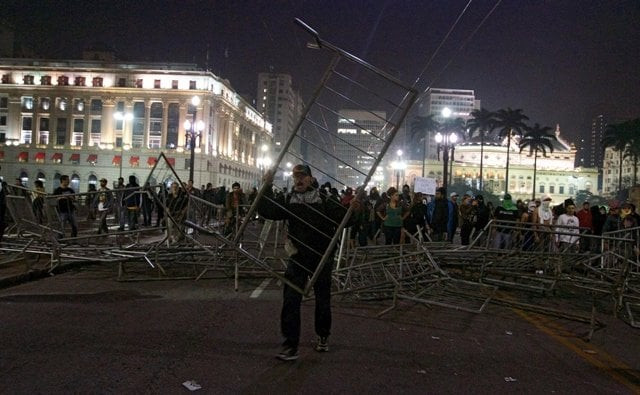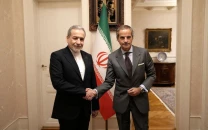Brazil police, protesters clash anew during Confed Cup
Brazilian police clashed with protesters Thursday ahead of a Confederations Cup semi-final

Brazilian police clashed with protesters Thursday ahead of a Confederations Cup semi-final. PHOTO: AFP
A wave of nationwide mass demonstrations, which began more than two weeks ago against a backdrop of anemic economic growth and rising inflation, have coincided with the Confederations Cup, a dry run for the 2014 World Cup.
Protesters are clamoring for better public services and tougher penalties against corrupt politicians, and are angry over the billions of dollars being spent to host the two high-profile football tournaments and the 2016 Summer Olympics.
The death toll from the more than two weeks of protests rose to five Thursday, when a 21-year-old man died in hospital a day after he fell from an overpass during a demonstration in Belo Horizonte.
The demonstrations have tapered off in terms of size -- down from 1.2 million people that flooded the streets of Brazil's major cities one week ago -- but those demanding change are still turning out with great passion.
About 5,000 young demonstrators staged a peaceful march Thursday in the northeastern city of Fortaleza to the Castelao stadium, where Spain edged Italy 7-6 on penalties to book a place in Sunday's final against Brazil in Rio.
"We are not against (world's football governing body) FIFA or the World Cup, but we are against the huge investments made (for the event). Public health, education, and roads are in a sorry state, and politicians prefer to invest in football," said protester Teo Sucupira.
Police clashed with a small group of hard-core protesters that hurled stones and tried to remove metal barriers set up to block access to the stadium. Some protesters set tires ablaze.
Police said they arrested 84 people. At least five demonstrators and three police officers were injured in the confrontation, the G1 news website reported.
Another 5,000 people also took to the streets of downtown Rio de Janeiro, while in Porto Alegre protesters gathered to demand lower public transportation fares.
In Brasilia meanwhile, Rousseff met with the leaders of parties in her ruling leftist coalition.
After the meeting, Education Minister Aloizio Mercadante said there was broad agreement on the planned non-binding plebiscite on campaign finance reform and reforming the current proportional representation voting system.
Mercadante however stressed that Congress, the only body empowered to convene a plebiscite, "will have the final word."
Rousseff was scheduled to meet opposition lawmakers on Friday to discuss the issue.
"The government believes that the people must be heard," said Mercadante.
But opposition parties have made it clear they think it is up to Congress to craft a political reform, which the electorate can then approve or reject in a referendum.
Feeling the heat from the streets, Congress has been rushing through a series of bills that had been on hold for years.
The Senate backed tougher penalties on corruption. It also scrapped a proposed constitutional amendment that sought to curb the investigative powers of independent public prosecutors.
The Supreme Court meanwhile ordered the arrest of lawmaker Natan Donadon, who was sentenced to 13 years in jail in 2010 for embezzlement -- the first such move in 25 years.
In other concessions to the protesters, the Chamber of Deputies backed a bill that would allocate 75 percent of oil royalties to education and 25 percent to health.
The bill now goes to the Senate, but some of the articles could face a presidential veto as Rousseff said she wanted 100 percent of the revenues to go to education.
The government also announced plans to create 35,000 jobs in the public health sector that would be open to foreigners if not enough Brazilians are found.



















COMMENTS
Comments are moderated and generally will be posted if they are on-topic and not abusive.
For more information, please see our Comments FAQ